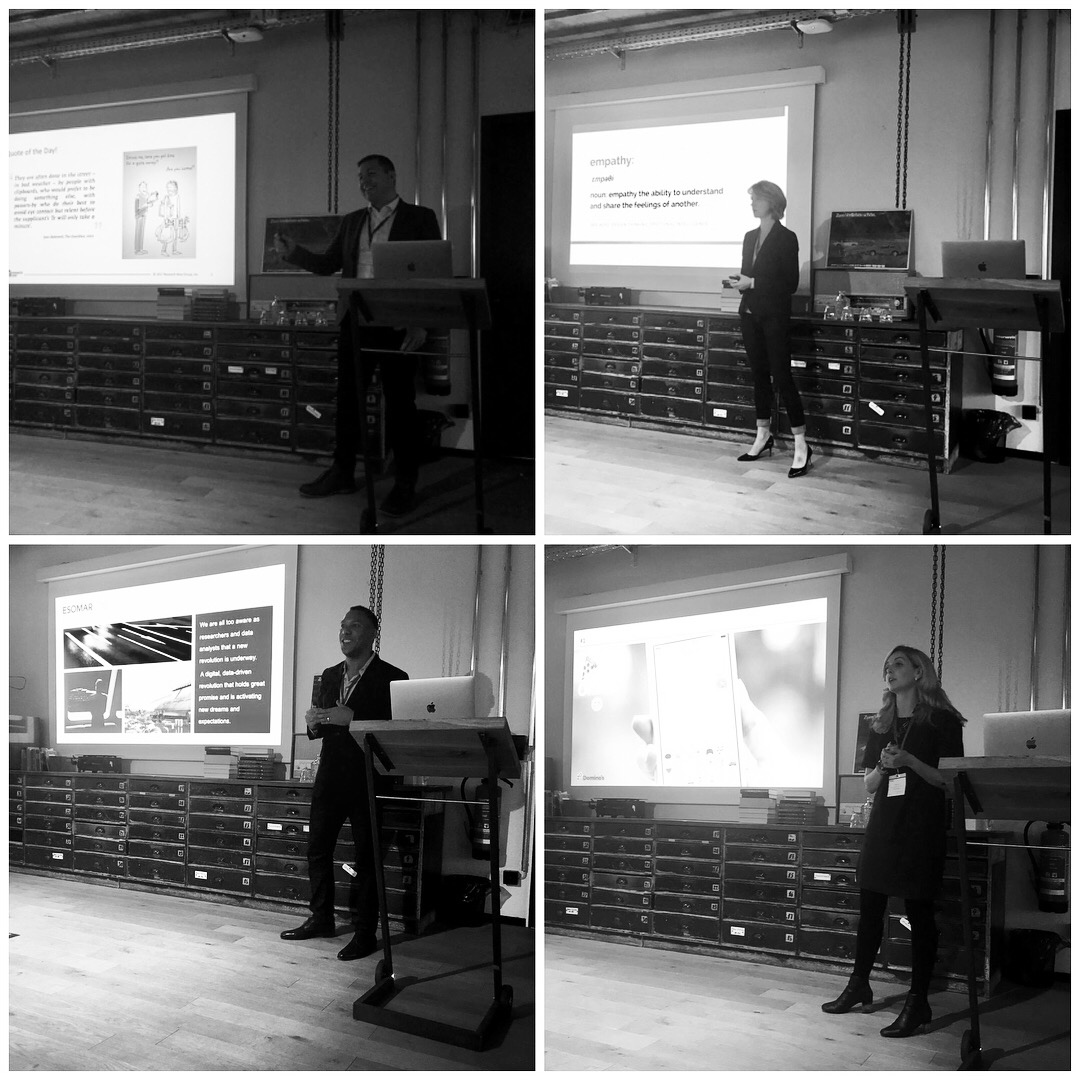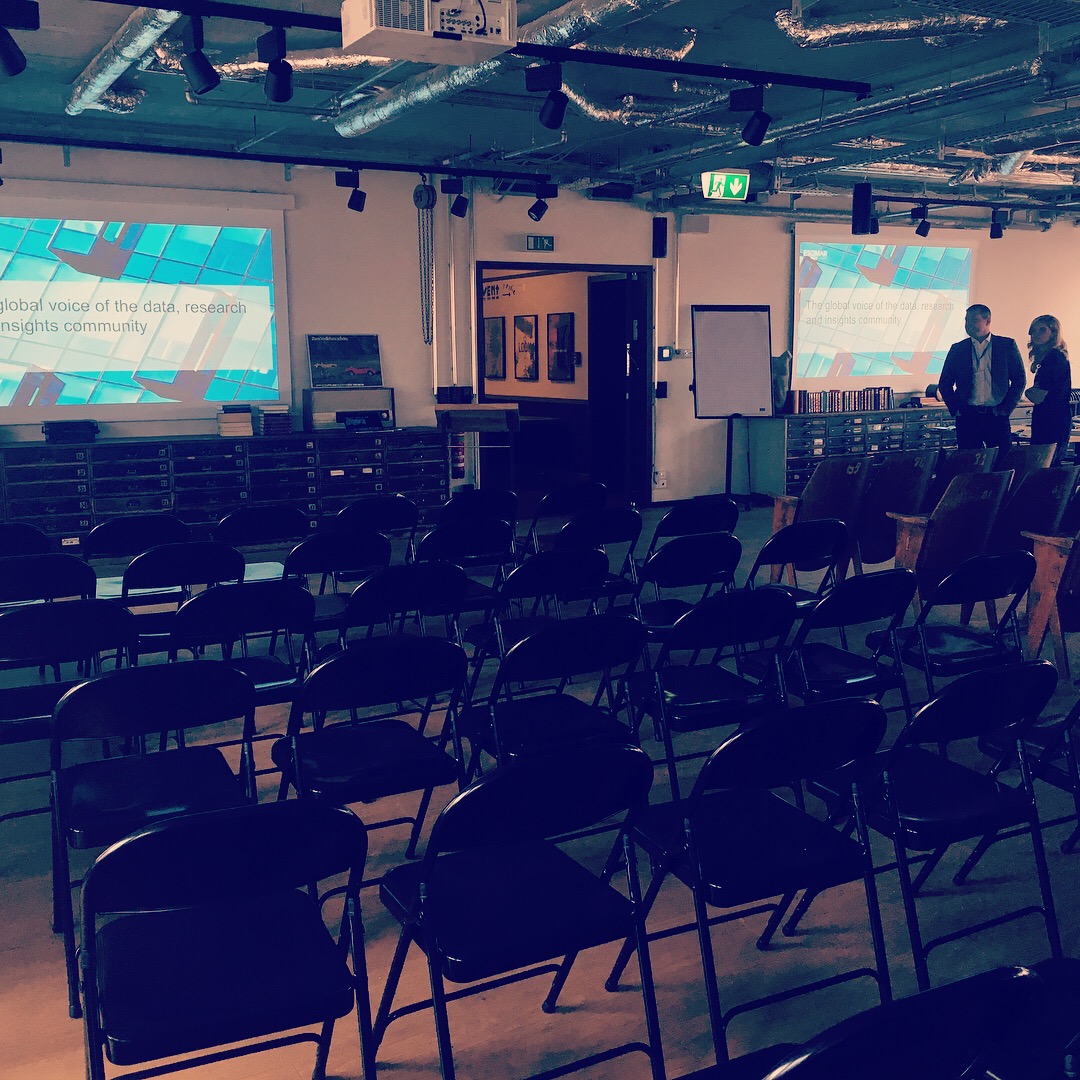By Christoph Welter
This year at the Best of ESOMAR-Germany meetup, we measured the pulse of the industry at what seems to be one of the most hotly contested metrics these days: Trust! In four talks that scrutinized the topic from different perspectives, we talked about surveys and all manner of interview techniques, about participants, about clients and about the wider public – so how is research doing, and how can we regain some of the trust that we seem to be losing?
Nikki Lavoie of Mindspark asked two simple questions in the course of her talk: Imagine somebody asks you if you’re up for having lunch with them for an hour, or alternatively, that they offer you 10 Euros for having lunch with them for an hour. The latter is the mode we routinely bring our participants into. “What is happening to our participants in that moment” Nikki quizzed the audience. In fact, we switch them into economic actors, weighing costs and benefits… is that what we want? Do we really want participants that measure their time expenditure against the money we offer? This was the central argument in Nikki’s criticism of our reliance on extrinsic motivation through monetary incentives.
The talk raised quite some controversial discussion amongst the audience – it seems Nikki hit a nerve there. And let’s make one thing clear: She doesn’t advocate that we should all scrap monetary incentives now, but we shouldn’t rely on them exclusively, as it will get us into an ever aggravating price spiral. Rather, we should think about how to engage with participants using empathy – before we actually meet them or engage them in a survey. How can we invite them to participate in a manner that will trigger their intrinsic motivation, make them feel valued and appreciated right from the get-go?
A large-scale survey on the public perception of research carried out by Research Now with the support of ESOMAR, in fact tapped into a matching challenge. Liam Corcoran of Research Now presented key findings from the study in the UK, USA and Germany. In order to gain a broad picture of how people relate to research, they included a variety of different channels, from CATI across online panels, social media panels, and also Google Consumer Surveys. A somewhat worrying key finding for Germany: People tend to try and complete surveys as quickly as they can. And here we are again: economic logic – price vs. time spent – utility maximizing actors.
What can we do? Liam pointed towards a potential crucial issue: people often don’t have a clear idea what a survey is for, what is the purpose, the Why. And what will happen with the data – where do they feed into? If people don’t know why they are participating, they might not put a lot of effort into their participation, and they might not trust the industry that is behind these surveys a lot. So, in conclusion, Liam alerted us to the need for the research industry to engage the public more, to involve participants more, and eventually also to involve the clients even more – education on the potential and the limits of research.
Kim Smouter, Head of Public Affairs and Professionals Standards at ESOMAR, presented some of the recent activities on behalf of ESOMAR which aim in exactly this direction: Raising the profile and reputation of research with the wider public, and crucially, with political actors. In a data driven world, political actors at the EU level need to understand the positive impact that research makes for society, and they need to understand how their actions affect the potential and limits of our industry. Of course, this requires each and every one of us to be mindful of our own ethical responsibility, so that we can establish ethical transparency and good conduct along the whole supply chain.
Finally, then, we asked: What advice and input can the next generation of researchers give us? So we had invited Emma Kirk from JoinTheDots, winner of last year’s Young ESOMAR Society Competition at Congress in New Orleans. Emma reminded us of our responsibility to stay up to date and engage audiences with timely ways of communication. Enter the Emoji. It seems so simple to say that we should all use Emojis in research, almost a no-brainer – but Emma stressed that it’s a valuable, but by no means easy feat. There is still a lot of education to be done on the fact that Emoji in fact do constitute a veritable communication system, and something of a universal language. The tricky bit however is that the same visuals do carry culturally distinct meanings. And to complicate things further, depending on device and OS, the same Emojis might end up looking quite differently. And of course, in order to use them in scales of any kind, we need solid validation groundwork. Despite these challenges, Emma called out to the industry to continue promoting the use of Emoji – after all, speaking the language of the people we try to engage is one of the most basic conditions for trust to emerge in the first place.


Christoph Welter is Managing Director at Point-Blank International and ESOMAR Representative for Germany.


